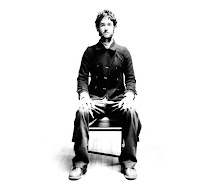On my ferry to Chiloe, I saw a sea lion and a penguin swimming alongside the boat. Chiloe: a massive win already.
I arrived in Ancud, Chiloe, promptly got lost walking to my hostel, but luckily almost every square inch of the island is picture-perfect, so I had some nice things to look at as I walked. The token old man came onto me. If life keeps going like this, I guess I'll never have to worry about ending up alone, there always seems to be plenty of old men who want me to keep their bed warm.
After arriving at the hostel I shortly became acquainted with two 19-year-old British girls, who made me feel old in no time. We wandered, and in addition to the afore-mentioned (pictured) iced coffee, I picked up that book on Chiloe mythology. I'll come clean here, one of the big draws to Chiloe, for me, was this mythology. My Rough Guide had mentioned the stories of mermaids and witches, and this type of folklore completely delights me. Somewhere in Central America I remember asking a companion why we hadn't come across more sea-centered legends. I mean, with other lands tossing around their stories of mermaids, sirens, selkies, the sea seems to have inspired such lore for centuries. Why had I not heard of more stories like these in a strip of countries lapped on both sides by ocean waves?
Perhaps there's a certain type of ocean that inspires these stories. Not the aqua waters of the Caribbean, but the rugged cliffs and rocks of a dramatic coastline. The kind that you find in Ireland, Scotland, Greece. Because that's exactly what Chiloe (and Chile in general, for that matter,) has. The next morning myself and three Brits drove west to a beach where we could take a boat out to see penguins, and honestly I felt like I had stumbled into the film The Secret of Roan Inish. And such a setting is obviously suited for fostering mysterious legends of women in the waves and sneaking demons.
Chiloe has a lovely light to it. No matter the time of day, I felt like I was in perma-sunset. The golden hour that photographers know and love, just before the light slides to the other side of the world. The island was completely idyllic. It still largely subsists on farming and fishing. I actually felt like it was how I always imagined Avonlea (of Anne of Green Gables fame) to be, minus red roads, plus some penguins.
Oh the penguins. I don't generally get too excited about seeing wild animals. I think I got over it in Kenya when I saw plenty of monkies, elephants, insects, what have you. I didn't squeal with glee in Central America when I saw sloths hanging from trees or spider monkies skittering by looking for food to steal. But the penguins totally undid me. I squealed along with the rest of the tourists on my boat and I took a million pictures. Though unfortunately a picture cannot capture HOW ADORABLE the penguins are when they move! No matter what they did, whether it be spreading their wings, ruffling their feathers, especially WALKING. Let alone running. And then, as if I wasn't undone with sheer cuteness already, SEA OTTERS appeared. The boat trip was far too short.
I met such a lovely temporary travel companion in Ancud: Allie, a British author visiting briefly while she is crashing at a friend's house in Pucon. We bussed down to Castro together, an altogether charmless town on a completely charming island. As soon as we left the town, on a bus to the national park, we slapped our foreheads wondering why in the world we weren't staying in any of the darling little towns along the road. Anywhere would be better than Castro. Oh well, lesson learned for next time.
We discovered a fantastic beach at the national park. It was looooooong. And almost completely deserted. When we settled into our cradles of sand, we felt like we were the only witnesses to the crashing layers of waves. It was fantastic. I have always been a fan of a dramatic coastline, much preferring it to the more-often-sought-after Caribbean coastline. So I was completely content, even though the water was too cold to swim in (not to mention the rip tides I could see!). Set in between cliffs, and beyond the grassy dunes, this beach was expansive and flat, so that when the waves lapped in, the water was spread extremely thin, creating sheets of ocean that slowly slid up and down the sand. When I walked towards the waves, I could walk forever without getting too deep in the sea. And when I walked along the coast, these sliding plates of ocean gave me the impression I was walking on the water. It was awesome. And it was all mine. Allie, left behind sun-bathing, was the closest witness, and she couldn't see me. So I could run, dance, sing, splash along the coast as much as my heart desired. For a few hours, a good kilometer of gorgeous, dramatic, Chilean coastline was the property and delight of one Laura Sorensen. It belonged to me, because I loved it. And then some beautiful cows joined us, who sees cows at the beach? Good times.
Yes, Chiloe was lovely. It didn't feel much of the earthquake, in fact many slept through it. Internet, electricity, and phones were down the next day, but Chiloe was lucky and escaped the profound destruction visited upon its sister cities.
I've got to say, I was so touched at the number of inquiries I found in my inbox once internet came back. I wish Chile had escaped such destruction, but it was nice to know how many people cared about me. Thank you.
Chile is so lovely. So much coastline perfectly suited to me. So much beautiful countryside. And a relatively small population to put it to use. I hope I get to spend a couple of months settled here sometime in my life, to get a better sense of the life here. The bus ride into Argentina was a gorgeous farewell as the bus plowed through ancient forests, mountains, and lakes in Patagonia.
Oh Patagonia, I am not finished with you.
Tuesday, March 2, 2010
I can walk on water too
Posted by A Jew and an Ex-Mo Go To South America at 10:54 AM
Subscribe to:
Post Comments (Atom)














1 comments:
Absolutely love the image of cows on the beach. It's popped into my head for the past few days and just makes me grin.
Post a Comment